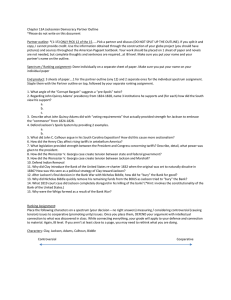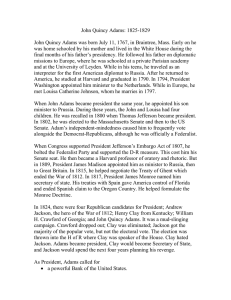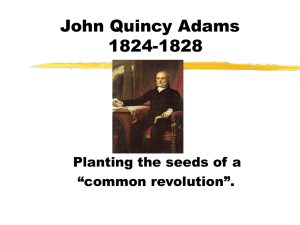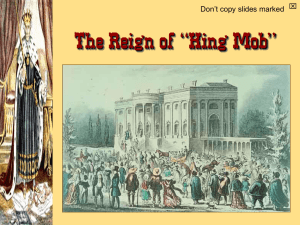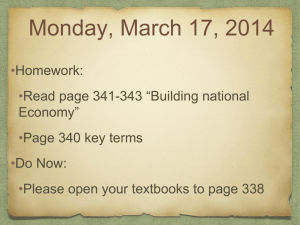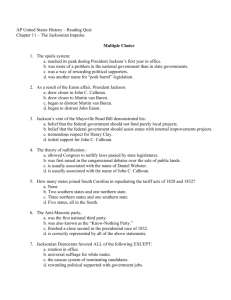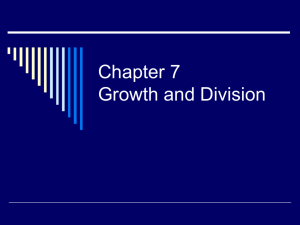Name Date Period _____ Chapter 13: The Rise of a Mass
advertisement
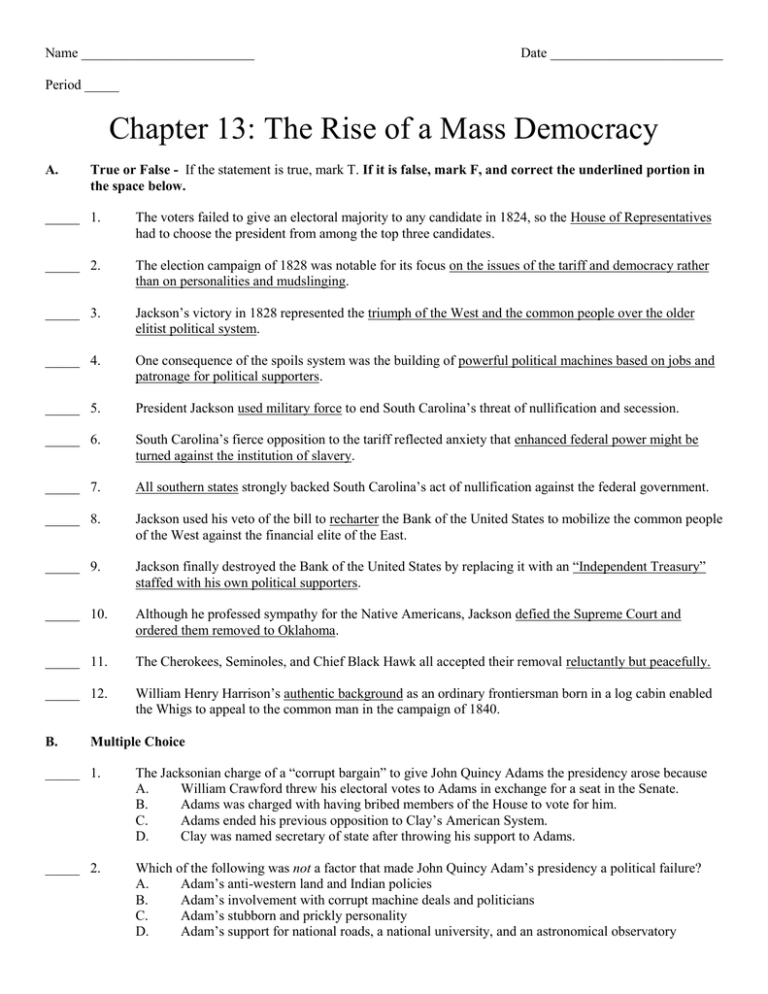
Name _________________________ Date _________________________ Period _____ Chapter 13: The Rise of a Mass Democracy A. True or False - If the statement is true, mark T. If it is false, mark F, and correct the underlined portion in the space below. _____ 1. The voters failed to give an electoral majority to any candidate in 1824, so the House of Representatives had to choose the president from among the top three candidates. _____ 2. The election campaign of 1828 was notable for its focus on the issues of the tariff and democracy rather than on personalities and mudslinging. _____ 3. Jackson’s victory in 1828 represented the triumph of the West and the common people over the older elitist political system. _____ 4. One consequence of the spoils system was the building of powerful political machines based on jobs and patronage for political supporters. _____ 5. President Jackson used military force to end South Carolina’s threat of nullification and secession. _____ 6. South Carolina’s fierce opposition to the tariff reflected anxiety that enhanced federal power might be turned against the institution of slavery. _____ 7. All southern states strongly backed South Carolina’s act of nullification against the federal government. _____ 8. Jackson used his veto of the bill to recharter the Bank of the United States to mobilize the common people of the West against the financial elite of the East. _____ 9. Jackson finally destroyed the Bank of the United States by replacing it with an “Independent Treasury” staffed with his own political supporters. _____ 10. Although he professed sympathy for the Native Americans, Jackson defied the Supreme Court and ordered them removed to Oklahoma. _____ 11. The Cherokees, Seminoles, and Chief Black Hawk all accepted their removal reluctantly but peacefully. _____ 12. William Henry Harrison’s authentic background as an ordinary frontiersman born in a log cabin enabled the Whigs to appeal to the common man in the campaign of 1840. B. Multiple Choice _____ 1. The Jacksonian charge of a “corrupt bargain” to give John Quincy Adams the presidency arose because A. William Crawford threw his electoral votes to Adams in exchange for a seat in the Senate. B. Adams was charged with having bribed members of the House to vote for him. C. Adams ended his previous opposition to Clay’s American System. D. Clay was named secretary of state after throwing his support to Adams. _____ 2. Which of the following was not a factor that made John Quincy Adam’s presidency a political failure? A. Adam’s anti-western land and Indian policies B. Adam’s involvement with corrupt machine deals and politicians C. Adam’s stubborn and prickly personality D. Adam’s support for national roads, a national university, and an astronomical observatory _____ 3. John C. Calhoun’s theory of “nullification” was based on the idea that A. the president should be able to block congressional laws without having his veto overturned. B. individual citizens could refuse to obey those laws that violated their conscience. C. states should be able to declare invalid those laws they deemed unconstitutional. D. a special national convention should be able to overrule acts of congress. _____ 4. One of Andrew Jackson’s weapons in his war against Nicholas Biddle’s Bank of the United States was A. seizing the bank’s branches and operating them under direct federal control. B. bringing criminal charges against Biddle for corruption and mismanagement of funds. C. removing federal deposits from the bank and transferring them to “pet” state banks. D. urging all Jackson supporters to withdraw their deposits from the bank. _____ 5. A particular source of friction between the government of Mexico and the immigrant settlers in Texas was A. the price of land. C. the treatment of women. B. the importation of slaves. D. the issue of settler voting rights. C. Identification - Supply the correct identification for each numbered description. _______________ 1. Office to which President Adams appointed Henry Clay, raising Jacksonian charges of unfair dealings _______________ 2. The popular idea that public offices should be handed out on the basis of political support rather than special qualifications. _______________ 3. Pamphlet secretly written by John C. Calhoun that bluntly called on the states to nullify the federal tariff law. _______________ 4. The nation from which Texas won its independence in 1836 _______________ 5. Popular symbols of the somewhat bogus but effective campaign the Whigs used to elect “poor-boy” William Henry Harrison in 1840 D. Matching People, Places, and Events - Match the person, place, or event in the left column with the proper description in the right column. You will not use all the descriptions. _____ _____ _____ _____ _____ 1. 2. 3. 4. 5. A. B. C. D. E. Talented but high-handed bank president who fought a bitter losing battle with the president of the United States Silver-tongued South Carolina senator who defended nullification in a famous debate of 1830. Presidential candidate who threw vital support to Adams and then became his secretary of state Former Tennessee governor whose victory at San Jacinto in 1836 won Texas its independence Once an ardent nationalist and vice president of the United States, then increasingly a spokesman for purely southern interests. Semiliterate, bear-killing Tennessee congressman whose rough popular appeal exemplified the New Democracy Majestic New England statesman who defended “liberty and Union, now and forever, one and inseparable” New England statesman whose nationalism and elitism made him unpopular in the era of sectionalism and popular democracy Mexican general and dictator whose large army failed to defeat the Texans Frontier aristocrat, military folk hero, hickory-tough candidate and president Jackson’s “magician” secretary of state and his most effective cabinet member Original leader of American settlers in Texas who obtained a huge land grant from the Mexican government F. G. H. I. J. K. L. Davy Crockett Henry Clay John Quincy Adams Nicholas Biddle John C. Calhoun _____ _____ _____ _____ _____ 6. 7. 8. 9. 10. Stephen Austin Sam Houston Santa Anna Martin Van Buren Daniel Webster
